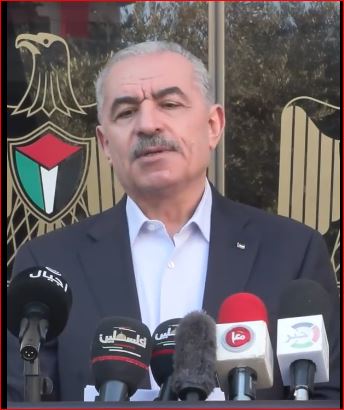Palestinian Authority Prime Minister Dr Mohammad Shtayyeh, who formally announced his government’s resignation on Monday
Under intense US pressure to reform, Palestinian Authority Prime Minister Mohammed Shtayyeh and his government submitted their resignations Monday.
In a post on Facebook, Shtayyeh said that “I would like to inform the honourable council and our great people that I placed the government’s resignation at the disposal of Mr. President (Mahmoud Abbas), last Tuesday, and today I submit it in writing.”
“I see that the next stage and its challenges require new governmental and political arrangements that take into account the emerging reality in the Gaza Strip, the national unity talks, and the urgent need for an inter-Palestinian consensus based on a national basis, broad participation, unity of ranks, and the extension of the Palestinian Authority’s sovereignty over the entire land of Palestine,” he added.
Abbas, who accepted the resignation, urged Shtayyeh and his cabinet to stay on in a caretaker capacity till a new government is formed and sworn in.
Even though it is known to be extremely corrupt by both Palestinians and the West, The US apparently wants a future independent state comprising the West Bank and Gaza to be governed by a ‘reformed’ Palestinian Authority. Israel however, is averse to both an independent state and the possibility of the PA ruling it.
Set up in the mid-1990s after the Yasser Arafat-led Palestine Liberation Organization signed the Oslo Accords with Israel, the PA is headquartered in the occupied West Bank city of Ramallah. Dominated by the Fatah, it also administered Gaza until Hamas expelled it from the strip after winning the 2006 legislative elections. Abbas, a former Prime Minister, became President after Arafat died in November 2004.
The resignations come as the Israeli Defence Forces submitted plans to evacuate civilians from Rafah, at the southern end of the Gaza Strip bordering Egypt, before launching an assault to clear it of Hamas fighters and track down 130 hostages reportedly being held there, with some reports saying many of them had died. Ignoring calls from its allies including the US to give peace a chance,
Prime Minister Netanyahu said a strike was needed to root out four battalions of Hamas fighters based there. “We can’t leave Hamas in place. We can’t leave a quarter of Hamas battalions in Rafah and say, well, that’s fine,” he told the American news channel CBS in an interview. “If we have a deal, [the operation in Rafah] will be delayed somewhat. But it’ll happen. If we don’t have a deal, we’ll do it anyway. It has to be done.”
Also See
In a career spanning three decades and counting, Ramananda (Ram to his friends) has been the foreign editor of The Telegraph, Outlook Magazine and the New Indian Express. He helped set up rediff.com’s editorial operations in San Jose and New York, helmed sify.com, and was the founder editor of India.com.
His work has featured in national and international publications like the Al Jazeera Centre for Studies, Global Times and Ashahi Shimbun. But his one constant over all these years, he says, has been the attempt to understand rising India’s place in the world.
He can rustle up a mean salad, his oil-less pepper chicken is to die for, and all it takes is some beer and rhythm and blues to rock his soul.
Talk to him about foreign and strategic affairs, media, South Asia, China, and of course India.





